In January 2020, I experienced Bangkok’s restaurant scene in all its splendid glory. These were the halcyon days: the city’s culinary offering had changed beyond all recognition since my last trip in 2011. The ubiquitous side-street vendors and eateries were still in welcome abundance – think plastic seating, exhaust fumes and hot, spicy nibbles – but they had been joined by an expanding firmament of upmarket destinations where experimentation was the name of the game.
The number of Michelin-starred restaurants that were not reliant on five-star hotels had also increased noticeably, in addition to the vibrant international scene. Excellent Vietnamese, Cantonese, Italian and French culinary artistry was now available in abundance. Pop-up was another concept very much in vogue in Bangkok in February – an evening at one of the pop-up beer gardens is a great way of soaking up the atmosphere prevalent in Asia’s most exciting metropolis.
Then Covid-19 happened. The Coronavirus has done great damage to the world’s hospitality sector and Bangkok is no exception. I had intended to write this guide in March 2020, but it seemed highly inappropriate when businesses were staring oblivion in the face.
However, in late April the Thai government made an announcement which brought a well-earned smile to the faces of Bangkok’s restaurateurs. Dining venues, in addition to other businesses like salons and shopping malls, were being permitted to open and welcome customers once again. Of course, this came with many stipulations: owners were required to maintain social distancing; live music performances were not permitted; seating had to be spaced 1.5 metres apart and appropriate partitions between customers had to be installed. But crucially, businesses could start earning revenues again, although many venues had managed to stay alive by offering home delivery services.
The following guide is an ode to these hard working chefs, owners, waiting staff and managers who have helped to propel Bangkok’s culinary scene to the ranks of Asia’s best. These are the restaurants which go above and beyond.
Paste Bangkok
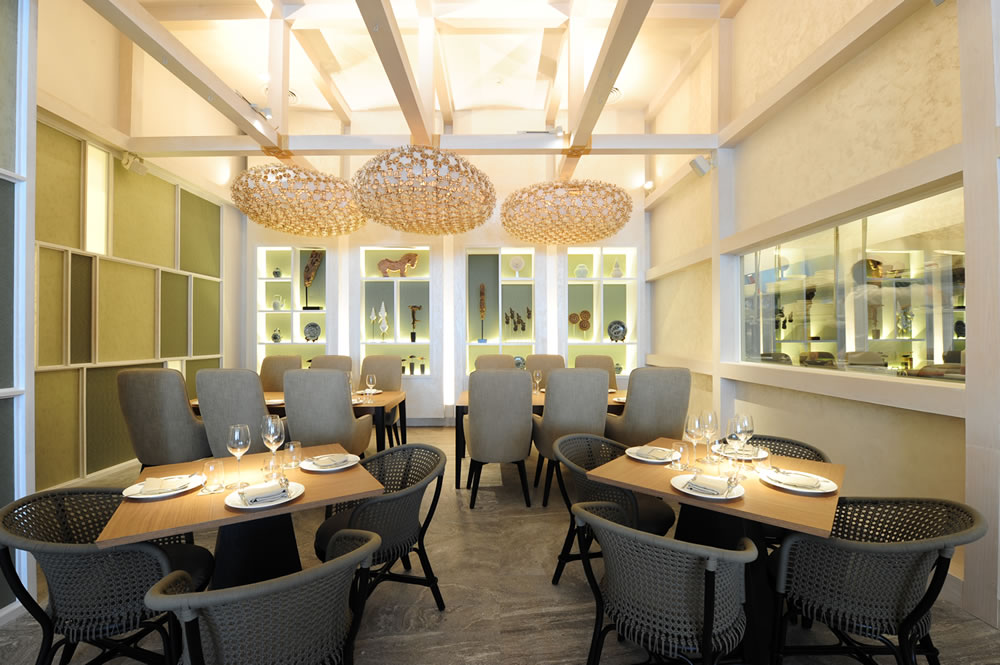
Opened in 2013 by husband and wife team Jason Bailey, born in Australia, and Bee Satongun, Paste now competes for the title of Bangkok’s finest Thai restaurant. Awarded one Michelin star (it deserves at least two), this wonderful venue treads a delicate line between Michelin-grade service and gastronomy, while maintaining a casual ethos. It offers a very sophisticated, polished product, with all the friendly overtones you’d expect from a restaurant in the heart of Bangkok.
Bee Satongun is not attempting to emulate ‘Parisian style’ service and indeed prices, however, she is keen on enhancing diners’ knowledge of Thailand’s incredibly diverse food culture.
The venue initially opened in the Sukhumvit district, but the owners decided it would fare better in a upmarket shopping mall space called Gaysorn Plaza in 2015. During my inaugural visit in February, Bee was on hand to explain her desire to reinvigorate interest in “heirloom Thai cuisine.” That is to say, traditional recipes from the late 19th to early 20th centuries.
I received quite an education: like many aficionados of Thai cuisine, I was guilty of underplaying the importance of regionality to the nation’s palate. Our host underlined the point that this beautiful country boasts not one single food culture, but rather four regional cuisines that correspond to the vast geographical differences across Thailand; southern Thai cuisine is very different to the Chinese-influenced dishes found in the north.
Of course, Bee’s culinary art was ultimately far more exciting than the theory. Every dish had a sublime intensity of flavour, underpinned by exciting textural contrast without losing sight of the imperative of the key ingredient. Witness: Na Tung Khek, a roast duck dish served on rice crackers with expert spicing involving nutmeg, curry paste, and sawtooth coriander. Meanwhile, the pomelo salad of char-grilled scarlet prawns, Asian citron, chilli jam and gapi khoei plankton paste contained more flavour in one bite than my entire meal the night before. But if that wasn’t enough, the wine pairings were expertly judged, while the service was simultaneously courteous, warm and very professional. Paste Bangkok deserves to thrive, particularly in post Covid-19 world.
Address: Gaysorn Village, 999 Phloen Chit Rd, Lumphini, Pathum Wan District, Bangkok 10330
Website: pastebangkok.com
Charcoal
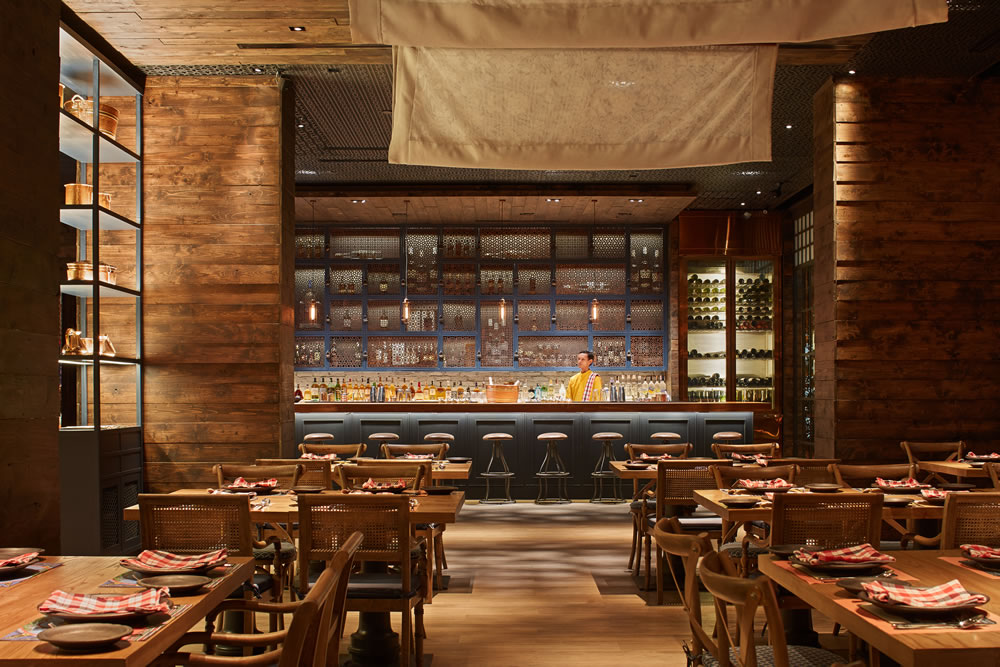
In 2011, I enjoyed a memorable trip through India’s media and Bollywood capital – Mumbai. The meals were often excellent, but I must concede that Bangkok’s Charcoal restaurant leaves most of Mumbai for dust. Its secret? Serving fresh meat kebabs and seafood cooked in authentic tandoor clay ovens. The resulting flavours aren’t just to die for; I’d happily have Charcoal prepare my last meal. The technique has been used in central Asia for centuries; exposing meat to live fire cooking smokes in the fat and juices that drip from the meat onto the charcoal. It’s hardly a recipe for medical approval, but the results are worth it.
Murgh Malai Kebab set the bar for our expectations – boneless chicken marinated in cream cheese, yoghurt, malt vinegar, green chilli and coriander was both exquisite and judiciously spiced. However, the New Zealand lamb chops marinated in red chilli, cumin, malt vinegar, ginger and garlic just pipped them to the post; marrying the sweet succulence of New Zealand lamb with such intelligent spicing created gastronomic heaven. Aromatically intense, the lamb was imbued to its core with the benefits of smoking meat in a clay oven. There was an intensity to the flavour unlike anything I’ve experienced before.
Charcoal delivers all this hedonistic pleasure with a smile. The team of (largely) Indian staff were courteous and charming; owner Rohit Sachdev has clearly invested a lot in staff training. Cocktail lovers among you will also be very satisfied, as Charcoal has curated a bespoke list of spiced libations, expertly mixed by a duo of bartenders. Served in vessels that Sachdev collected from the antique shops of Delhi, they complement the culinary offering in a way that wine never could.
Address: Fraser Suites Sukhumvit, 38/8 Sukhumvit Rd. Soi 11 5th Floor Khlong Toey Nua Watthana, Bangkok 10110
Website: charcoalbkk.comcharcoalbkk.com
About Eleven
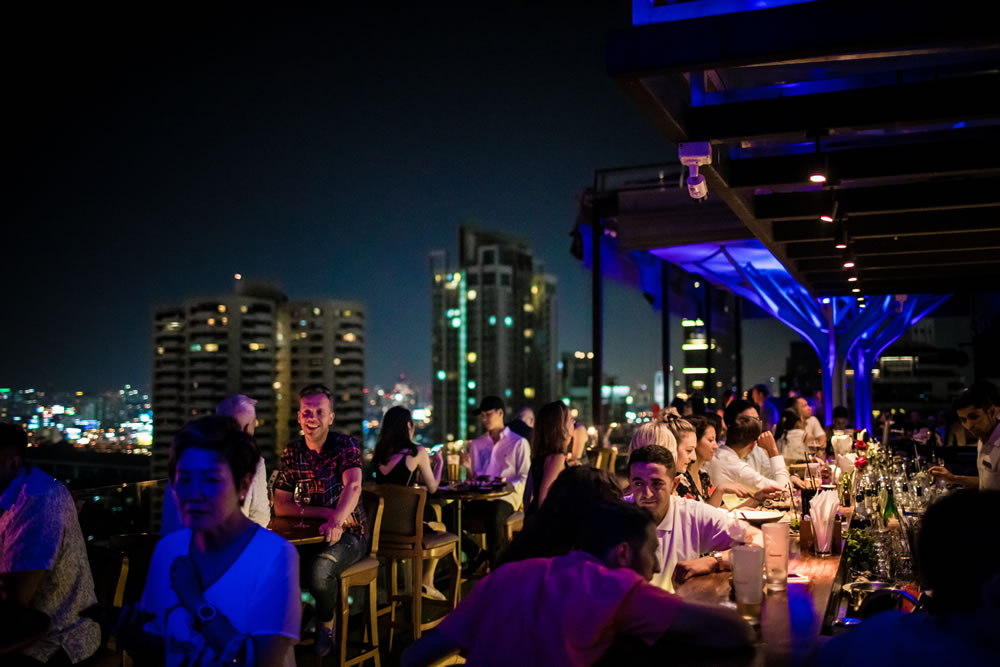
Bangkok is a very liberal city, with few hangups or qualms about anything. Particularly in the cocktail bar department, where nobody seems to mind if you slap a bar on the roof of a skyscraper – be it hotel or housing project. Once the preserve of well-heeled tourists, today these numerous sky bars comprise a diverse spread, with options ranging from basic to formal. But what unites this ensemble is an unwavering emphasis on excellent service, bespoke cocktails and, of course, ‘Instagramable’ views to die for.
Above Eleven is one such bar. Conveniently located in the same building as Charcoal, this is my favourite sky bar in Bangkok. It trades heavily on its excellent, ‘Peruvian-inspired’ cuisine, but it’s the superlative mixology and unbeatable views that keep Above Eleven packed midweek. The space is gorgeous; inspired by the lack of green spaces in this mega city, the bar features a maze, structural metal trees, park furniture and faux-grass cladded walls and decking. But most refreshingly, Above Eleven is experience-orientated, unpretentious and value for money, a rarity among Bangkok’s firmament of swanky sky bars. The formulae is simple: first-rate cocktails, first-rate views, friendly staff.
Address: 38/8 Fraser Suites Soi Sukhumvit 11, Khlong Toei Nuea, Bangkok 10110
Spectrum Lounge and Bar at Hyatt Regency Bangkok Sukhumvit

Bangkok is overstuffed with hotel bars – some of them utterly anodyne and forgettable, some of them worth the effort. The Hyatt Regency’s rooftop bar and restaurant falls into the latter category. Situated on the 29th and 30th floors of the hotel, the space is divided into a rooftop bar complete with live DJ music, and the more serene restaurant on the 29th. The rooftop is a great, if noisy, space to grab an expertly-mixed cocktail, however, we preferred the more relaxed vibe of the rooftop restaurant.
But how easy it would be for the Hyatt Regency to simply cash in on the surrounding cityscape. Tourists would flock regardless, even if the culinary art was reheated lasagne sans beef. Thankfully, the small plates and larger options were uniformly excellent: grilled meats, flatbreads, steaks and salads tempt even the most jaded palate. The wine list was also kicked up several notches higher than the Bangkok average, with a welcome bias towards New Zealand wines. The rest fell into line with the Hyatt’s ethos: slick service, efficient staff and five-star comforts.
Address: Spectrum Lounge and Bar,1 Soi Sukhumvit 13, Khwaeng Khlong Toei Nuea, Khet Watthana, Krung Thep Maha Nakhon, 10110, Bangkok
Mei Jiang at The Peninsula Bangkok
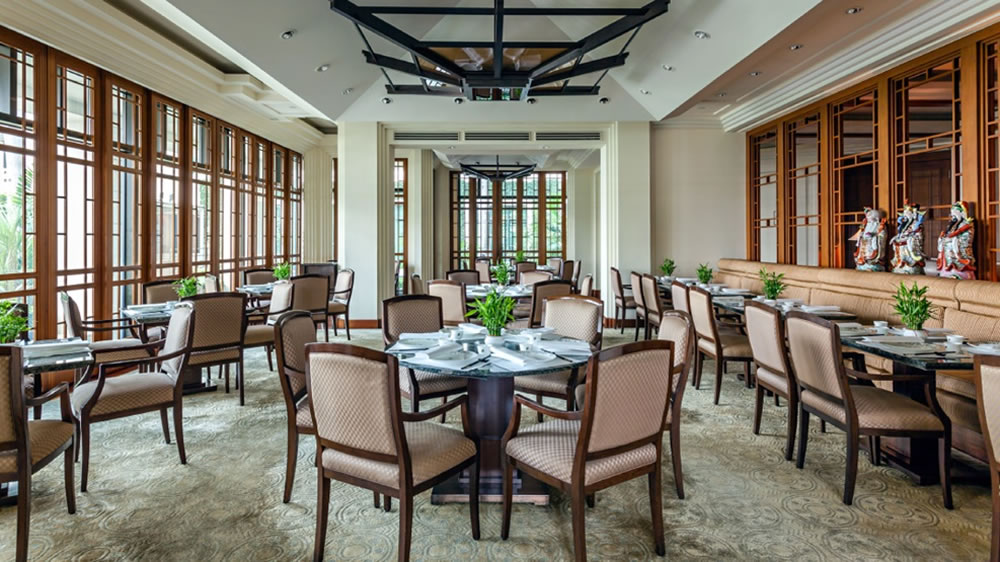
After an exhaustive search, I’ve found Bangkok’s finest Chinese restaurant. For although it may seem ludicrous to search for the pinnacle of Cantonese cuisine outside of China, the city is bursting with talented chefs from Thailand’s northern neighbour. One such individual works at the ornate and luxurious Peninsula Hotel Bangkok. But of course he does.
During our visit in February, we sampled the new Eight Elements ‘surprise and delight’ tasting menu. The emphasis was on traditional Cantonese dishes, kicked up a couple of notches in the innovation and creativity department. Sometimes unfairly judged as a second-rate culinary contribution – when compared to the crowd-pleasing fieriness of Sichuan cooking – Cantonese is nevertheless a masterclass in refinement and subtly. Meat tends not to feature heavily – garlic and spices are seldom employed. No, the Cantonese school puts the top priority on seafood and chefs prefer to let the freshness of the dish speak volumes.
This was very much in evidence during our meal at Mei Jiang. There was theatre – plenty of it, in fact – but at its heart was a love of classical, nourishing Cantonese cuisine. Every dish displayed a pleasing textural contrast and offered direct flavours that did not require any embellishments. Steamed sea bass was a model of delicacy and refinement, while the dim sum provided a stark reminder that Mei Jiang thoroughly deserves its Michelin star. The ubiquitous Chinese dumplings are always served over the Spring Festival and originally hail from northern China, where traditionally the pastry is shaped as money, to bring good fortune and wealth for the year ahead. We asked for a second helping.
As befits the ethos of the Peninsula, the service was exemplary; warm and personable. The setting doesn’t disappoint either, with well-spaced tables that look out over the hotel’s garden. But, most importantly, the food was executed with the flair and precision of a true master – possibly the finest Cantonese food I have ever enjoyed outside of Hong Kong.
Address: 333 Charoennakorn Road, Klongsan, Bangkok, 10600
Cantina Pizzeria and Italian Kitchen
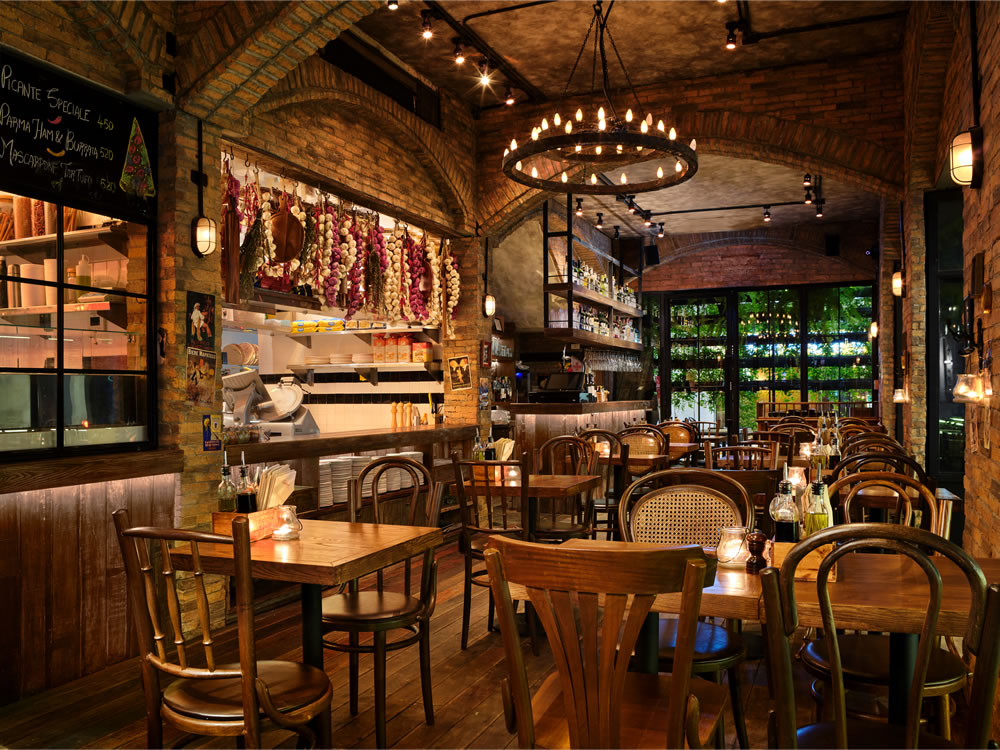
In 2011, trying to find a decent Italian restaurant in Bangkok was something of a futile endeavour. There were plenty of owners touting for your money, but the food was – at least in my experience – bastardised versions of Italian classics, lazily presented. However, Cantina Pizzeria and Italian Kitchen is the real deal. It caters to a welcome niche of tourists and Bangkok residents who crave a change from the local cuisine.
Anyway – to the food. First up was simplicity itself – a selection of fresh bread and olive oil, that most guilty of indulgences. There can be few pleasures in life more satisfying; the high bitter note of the oil contrasting against the gloriously rich texture of focaccia. As we gorged ourselves, ‘last-supper’ preparations sprang to mind. From the list of antipasti, crab salad was paired nicely with a suitably piquant green apple and avocado dressing; even better was my companion’s risotto, a proper no-nonsense interpretation of this classic Italian dish.
My favourite morsel, however, was ‘simplicity’ itself. For my money, Cantina cooks up the finest lamb chops in Bangkok, served on a bed of garlic mash. Good seared and pan friend lamb can silence even the most hardened of critics – meltingly soft and tender sweet cutlet of lamb, sat atop rich, buttery mash. Michelin-starred levels of culinary technique? Absolutely not, but I’d take it over molecular dishes on the edge of a nervous breakdown any day of the week. Oh, and the wine list and service are spot on as well.
Address: 26/3 Soi Sukhumvit 11, Sukhumvit Rd, Khlong Toei Nuea, Watthana, Bangkok 10110
Lord Jim’s at Mandarin Oriental Bangkok
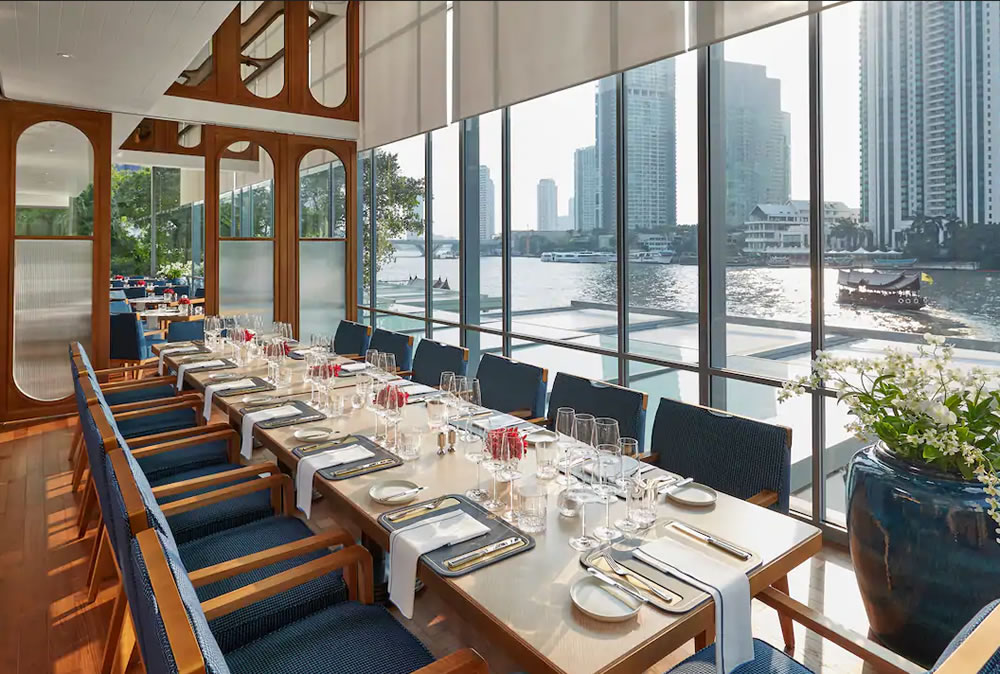
This hotel is where sybarites go to die. Inaugurated in 1876, the (then) Oriental hotel soon became a byword for luxury and unrivalled service. This ethos continues today, aided by a £70-million renovation of the Garden and Authors’ Wings and several of the hotel’s excellent restaurants.
Among them is Lord Jim’s. Extended during the refurbishment, the best tables in this handsome restaurant look out over the Chao Phraya river. It’s a dreamy scenario, only enhanced by the clientele. During our lunchtime visit, the restaurant was full of wealthy Thai families; despite the understandable popularity with Western tourists, suddenly we were transported to Bangkok at its most authentic. They arrive in eager anticipation of the most sumptuous, high-quality buffet in Asia. The choice is staggering: sushi and sashimi of all varieties, endless seafood, roast meats, international dishes and established classics such as pan-fried foie gras. To maintain such high standards across such a diverse range of dishes is outstanding and commendable. There was not one dud, not one lukewarm disappointment.
And then there’s the service. The Mandarin Oriental promotes itself as a ‘six star hotel’ – particularly in the service department. This is no idle boast: Khun Anusorn, a veteran of over 20 years, remains stationed by the lobby lift and recalls the floor every guest is staying on unprompted. Similarly, the restaurant staff displayed that most rarified quality – warmth and affability coupled with upmost professionalism and courtesy. The hotel is fortunate to employ Bangkok’s most charming sommelier and Maitre’d, but every member of staff rose to the occasion. Wine aficionados are also given top priority – the hotel boasts the finest wine tome in Bangkok. It comes at a price, of course, but the Mandarin Oriental leaves the competition for dust.
Address: 48 Oriental Ave, Bang Rak, Bangkok 10500
The Bamboo Bar at Mandarin Oriental Bangkok
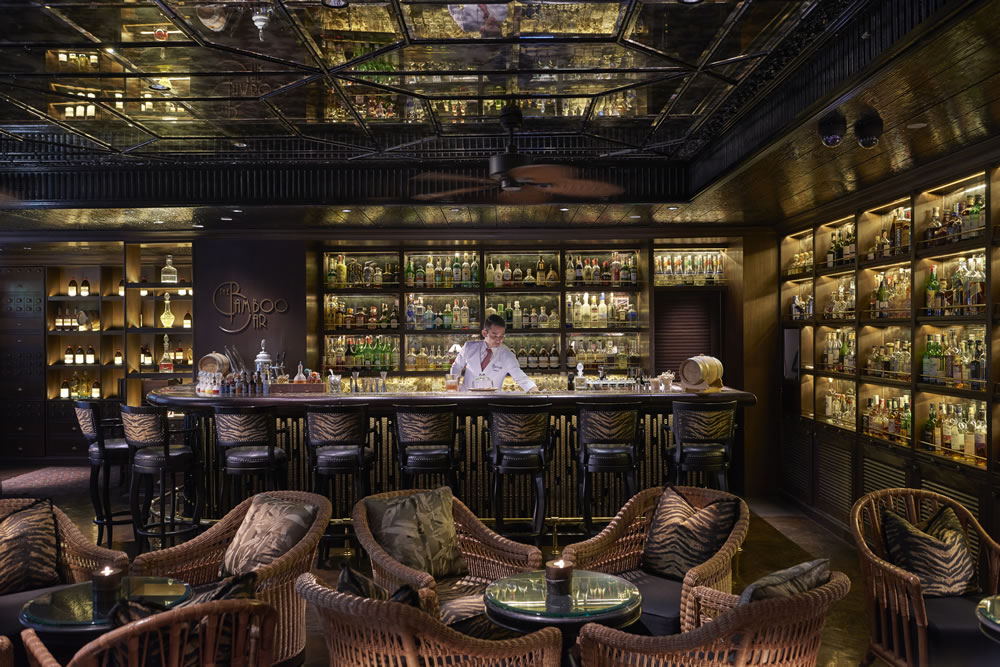
If you visit Lord Jim’s in the evening – which transforms into a more casual a la carte restaurant – then you must sample a cocktail or two at The Bamboo Bar. It will comes as no surprise that the city’s most luxurious address also houses Bangkok’s most glamorous cocktail bar. Ernest Hemingway eat your heart out, for the decor is like something straight out of a 1920s upmarket saloon, complete with bamboo furniture, tiger skin prints and reflective ceilings. The luxurious setting is complemented by the best live jazz the city has to offer, and a remarkable collection of spirits, which includes one of the largest collections of Single Malt Scotch whiskies in Thailand. Service is Mandarin Oriental standard: charming and gracious to the point of embarrassment.
Address: 48 Oriental Ave, Bang Rak, Bangkok 10500






















